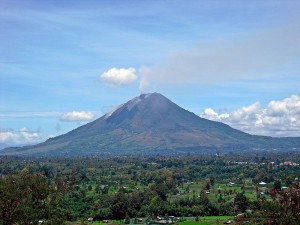Last week Mount Sinabung, an active volcano on the island of Sumatra (Indonesia), erupted killing at least 16 people. It is reported that a number of the deaths were people going back into the evacuated zone to see the eruption up close and to check on properties and land.
This is a sad reminder of the power of volcanic processes and their lethal potential (see the images on the BBC News), particularly striking as I look out on a number of active volcanoes in Guatemala. It reinforces the importance of integrated physical and social science approaches to hazard management and risk communication. Strong geoscience research needs to be combined with a better understanding of why people choose to live in such dangerous places and how best to communicate information to them in a way in which they can understand and make decisions from it. The interdisciplinary work that the STREVA consortium are doing to address the issue of strengthening resilience in volcanic areas is particularly encouraging and I would certainly encourage you to look at their outputs as they are being produced.
The question of why people live and work in such dangerous places is in one sense straightforward, and in other ways very complicated. In many places people have the daily task (sometimes a daily struggle) of earning a living – getting enough money and growing enough food to survive, send their children to school, get health care when necessary or access clean water. It is often the case that the lure of fertile soils to support these daily struggles can easily compensate for the seriously negative aspects of volcanic activity when they occur (and in some cases if they occur within the individuals lifetime). It can also be a result of family and cultural ties to geographic place, a revered position of a location within their culture, or perhaps land laws that make it difficult to access other land for cultivation.
Reducing exposure to hazards such as volcanic eruptions, therefore, requires a balance of better monitoring and research together with concerted efforts to reduce vulnerability (at both individual and societal level, and both physical/infrastructure vulnerability and social vulnerability. Projects such as the International Volcano Monitoring Fund support the development of facilities in less economically developed countries – so that more data can be gathered, and this data converted into useful understanding and preparation tools. This gathering of data and improved communication process must also go alongside efforts to support the lifting of people out of poverty. Not everyone who lives in a hazard-prone area does so because of poverty (for example, some of those houses most at risk of flooding with great sea views, can be the most expensive and reserved for the rich). In many cases however, whether its those building on unstable slopes because they want to be near to the city to earn a living – or those populating volcanic slopes because they can grow cash-crops and earn some money – it is the need to survive that drives their acceptance of the risk.
It can also be this poverty that drives people to return to evacuated zones, to check on land and property. In the UK many of us have a savings account, insurance – if our residences were to burn down or get flooded we would lose a lot of work and memories, but our ‘assets’ are spread out and we would be supported to bounce back. Our places of work are also often in a different location, so that we could continue to earn a living. Imagine that your home, assets and source of income were all in one location – and that location was at risk of destruction. You had no access to a bank account and no insurance options. The desire to check that things are ok would be significantly stronger.
Tackling this poverty is no easy task. Better education, better understanding and more research needs to be combined with the strengthening of rights and access to basic services. Insurance and access to bank accounts can help individuals spread assets and bounce back after a hazard event.
[Something you can do is make sure you pay a fair price for your latte or coffee in the morning. Coffee is often grown on fertile slopes susceptible to landslides and eruptions – people choose to accept a lethal risk to cope with the daily struggle of survival – paying an extra £1 a jar to make sure that those individuals can build better, send their children to school or develop their savings/access a bank account (so that they don’t feel such a strong need to return into evacuated zones to check their property) seems a very small price to pay].


Pingback: Field Research in Guatemala (4) – Reflections from Fuego | Geology for Global Development